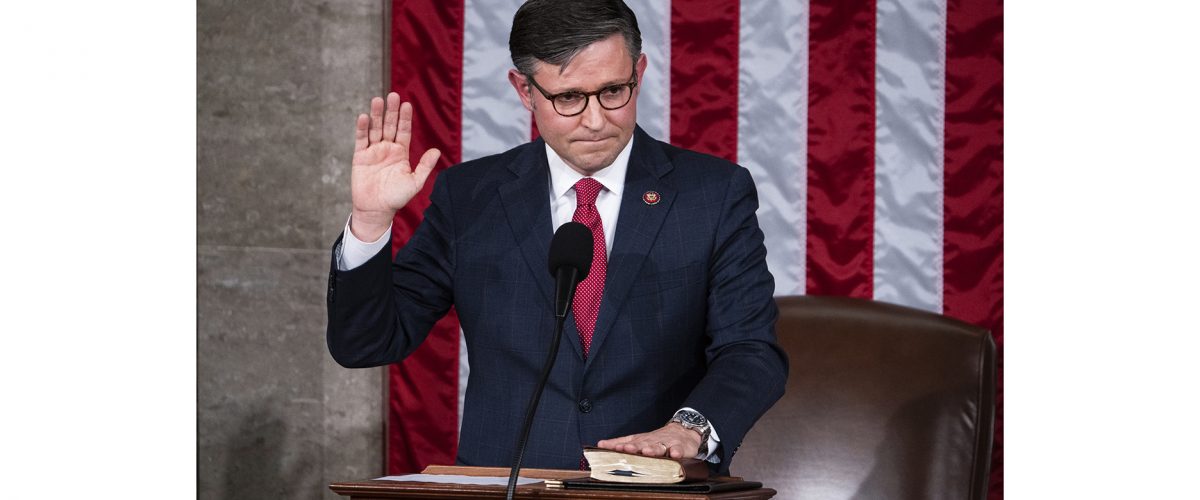The Speaker of the House is a Baptist of the conservative Southern Baptist variety. In his first interview after being elected speaker, Rep. Mike Johnson told Sean Hannity: “I am a Bible-believing Christian. Someone asked me today in the media, ‘What does Mike Johnson think about any issue under the sun?’ I said, ‘Well, go pick up a Bible off your shelf and read it.’ That’s my worldview.”
It reminded me of the guy who was sincerely searching for God’s will. He picked up a Bible, closed his eyes, let the Bible fall open, dropped his finger on a verse, and read from Judges 4:21, “Jael picked up a hammer, and drove the peg through (Sisera’s) skull as he was sound asleep. His brains oozed out on the ground.”

Jim Harnish
Not finding that to be very helpful, he tried again. This time his finger fell on Luke 10:37, “Go and do likewise.”
He tried again and read from John 13:27, “What you are about to do, do quickly.”
Simply picking up a Bible doesn’t answer the questions because the Bible is simply not that simple. Our “worldview” depends on which words we read, who said them, where they show up in Scripture, and how we interpret them. The speaker would have been more accurate if, with a touch of biblical humility, he had said, “My worldview is based on my interpretation of the Bible.”
Interpreting Scripture
United Methodists (along with Presbyterians, Episcopalians, Catholics, etc.) are “Bible-believing Christians,” too. Our UMC Book of Discipline declares: “Scripture is the primary source and criterion for Christian doctrine. … The Bible bears authentic testimony to God’s self-disclosure in the life, death and resurrection of Jesus Christ as well as in God’s work of creation, in the pilgrimage of Israel, and in the Holy Spirit’s ongoing activity in human history.”
The Discipline then calls us to interpret Scripture through reason, tradition and experience. To one degree or another, every faithful person uses those tools to interpret Scripture, whether they acknowledge them that way or not.
“Believing in the Bible has led me to different convictions than those held by the speaker of the House.”
I’m a “Bible-believing Christian” who has spent the past 50 years trying to help other people become “Bible-believing Christians.” But believing in the Bible has led me to different convictions than those held by the speaker of the House.
He interprets Scripture through his experience as a conservative Southern Baptist. He also interprets Scripture through a specific American tradition. Standing outside his office with the American flag and the Louisiana state flag is the “An Appeal to Heaven” flag.
That flag originally was used as a naval banner in the Revolutionary War. But in recent years it has been embraced by movements like the New Apostolic Reformation. Part of the NAR’s worldview is that God intends for Christians to take control of government in order to create a “Christian nation.” That’s what the Puritans tried to do in the 17th century. It has become popular among Trump supporters and was prominent in the January 6 insurrection.
But that’s not what all Baptists have always believed.
A Baptist hero
The Puritans were some of the first undocumented immigrants to this land. Reading John M. Berry’s powerful book, Roger Williams and the Creation of the American Soul: Church State, and the Birth of Liberty, gave me a much deeper appreciation of why the Puritans fled religious persecution in England in hopes of establishing a Christian community John Winthrop beautifully envisioned as a “city on a hill.” But by attempting to enforce their interpretation of Scripture through a merger of church and state, the Puritans fell into the trap of the persecuted becoming the persecutors.
“The Puritans fell into the trap of the persecuted becoming the persecutors.”
Roger Williams was a “Bible-believing Christian” who arrived a few months after Winthrop in 1630. He was, however, driven out of the Massachusetts Bay Colony at risk of his life because, in the words of Gov. Winthrop, he “broached & divulged diverse new and dangerous opinions.”
Williams preached what he called “soul liberty.” It meant a person’s religious views could not be coerced by the government, which was established by the people’s action and not by divine authority. Ann Hutchinson suffered the same fate for “holding and teaching unorthodox religious views.”
Williams helped found the first Baptist church in America in Providence, R.I., in 1638.
Williams died in 1683, but his convictions found their way into the Constitution. Barry concludes:
It is no myth that the Puritans who founded Massachusetts came to build a Christian country. … That belief is not myth but reality …
It is also not myth but reality that another informing principle runs like a great river through American history … first articulated when Roger Williams separated himself from the dominant view of the day and declared a citizenry “distinct from the government.”
And it is no myth but reality that the U.S. Constitution is an entirely secular document, with no reference to any entity that can be considered divine. … It prohibits a religious test for office and establishes absolute religious freedom.
I give thanks for Roger Williams. If I were not a Methodist, I’d be his kind of Baptist.
Jim Harnish retired after 42 years of pastoral ministry in Florida, concluding at Hyde Park United Methodist Church in Tampa in 2014. He is an author and blogger.


